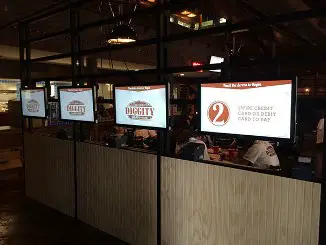 Diggity Drive Up, a new restaurant featuring gourmet hot dogs and sandwiches coupled with a craft beer bar, recently opened their doors in Coon Rapids, Minnesota, on July 17 amidst a touch of controversy. Some local residents and journalists have voiced criticism over the apparent replacement of traditional restaurants servers with kiosks. Local news even reported that Diggity had come up with a brand new concept, a “server-free restaurant,” sparking heated debate about jobs in the local economy.
Diggity Drive Up, a new restaurant featuring gourmet hot dogs and sandwiches coupled with a craft beer bar, recently opened their doors in Coon Rapids, Minnesota, on July 17 amidst a touch of controversy. Some local residents and journalists have voiced criticism over the apparent replacement of traditional restaurants servers with kiosks. Local news even reported that Diggity had come up with a brand new concept, a “server-free restaurant,” sparking heated debate about jobs in the local economy.
Reports are missing one key concept, however. Instead of utilizing traditional full service, Diggity has adopted the Fast Casual model similar to other industry giants Qdoba, Panera and Five Guys, to name a few where servers are not needed in the cafeteria-style atmosphere. Fast Casual diners are looking for a higher quality of food not offered by QSRs (fast food) without the time commitment found in traditional, full service restaurants.
Critics are right about one fact: Diggity has opted to eliminate cashiers in favor of self-order kiosks coupled with remote ordering. Customers perform the data-entry for orders themselves, formerly the role of the counter workers at most fast food establishments. Self-order options promise to be faster and more accurate for guests as they eliminate miscommunication between the customer and the employees, and restaurants see benefits from increased customer flow and less food waste due to incorrect orders.
Minimum wage has recently become a controversial topic, with fast food workers nationwide striking to bring attention to the question of what constitutes fair compensation in the industry. Demanding a $15 per hour “livable” wage more than double current federal minimum wage poses problems for restaurant owners who operate in what is widely considered a narrow profit margin industry.
For Fast Casual and Quick Service Restaurant business owners in a competitive niche, rising food costs coupled with other factors in a still-struggling economy force them to consider alternative means to keep operational costs down while delivering an affordable meal featuring quality food paired with a great experience for guests.
Anoush Ansari, managing partner for Hemisphere Restaurant Group and Diggity, simply wanted to deliver great American food with a technology-driven experience. Hemisphere wasn’t seeking to operate a full service restaurant with this particular concept as Ansari understands the costs associated with operating one. The main goal, Ansari explained, was to deliver great food in a Fast Casual atmosphere to keep costs low and deliver competitive prices for their guests. He continues to acknowledge that the rising cost of minimum wage affects the costs of dining, often passed on to the guest.
Customers interviewed by local news stations seemed to prefer the kiosks and didn’t miss having a server, comparing it much to a typical experience using self-checkout at the local grocery store, or to experiences at similar Fast Casual concepts. Another leading concept, Panera, recently spent $43 million to develop a new system with self-order and mobile ordering playing central roles, similar to the system provided by NEXTEP SYSTEMS (http://nextepsystems.com) for Diggity.
Tommy Woycik, President of NEXTEP SYSTEMS based in Troy, Michigan, says that self-order options aren’t replacing people, and are going to become more prevalent at the behest of guests, not just owners who want to lower operational costs.
posted by Nicholas Gonzales
08/11/14














